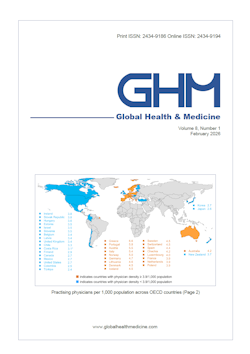Global Health & Medicine 2019;1(2):101-109.
Intestinal-type histology is associated with better prognosis in patients undergoing liver resection for gastric/esophagogastric-junction liver metastasis.
Ito D, Kawaguchi Y, Yamashita H, Arita J, Akamatsu N, Kaneko J, Sakamoto Y, Kokudo N, Seto Y, Hasegawa K
The indication for resection of gastric/esophagogastric-junction liver metastasis (GELM) has yet to be established. This study aimed to investigate prognostic factors in patients undergoing GELM resection. From 2001 to 2015, 31 consecutive patients underwent resection for GELM; and factors for poor prognosis were evaluated. Of the 31 patients, 23 (74.2%) developed multiple liver metastases. The histology of gastric cancer was intestinal-type adenocarcinoma in 21 patients (67.7%). Median overall survival (OS) was 3.2 years. The 1-, 3-, and 5-year OS rates were 92.8%, 56.2%, and 42.2%, respectively. The 1-, 3-, and 5-year recurrence-free survival (RFS) rates were 58.5%, 31.3%, and 31.3%, respectively. Multivariate analysis indicated that intestinal-type adenocarcinoma was associated with a significantly lower risk of OS (hazard ratio [HR], 0.26; p =0.022) and RFS (HR, 0.25; p = 0.008). In multiple logistic regression analysis, intestinal-type adenocarcinoma (odds ratio, 0.14; p = 0.012) reduced incidence of extra-hepatic recurrence after GELM resection. In conclusion, GELM resection in patients with intestinal-type histology is preferable because intestinal-type adenocarcinoma is associated with better prognosis and a lower incidence of extra-hepatic recurrence than diffuse/other-type adenocarcinoma.
DOI: 10.35772/ghm.2019.01012







